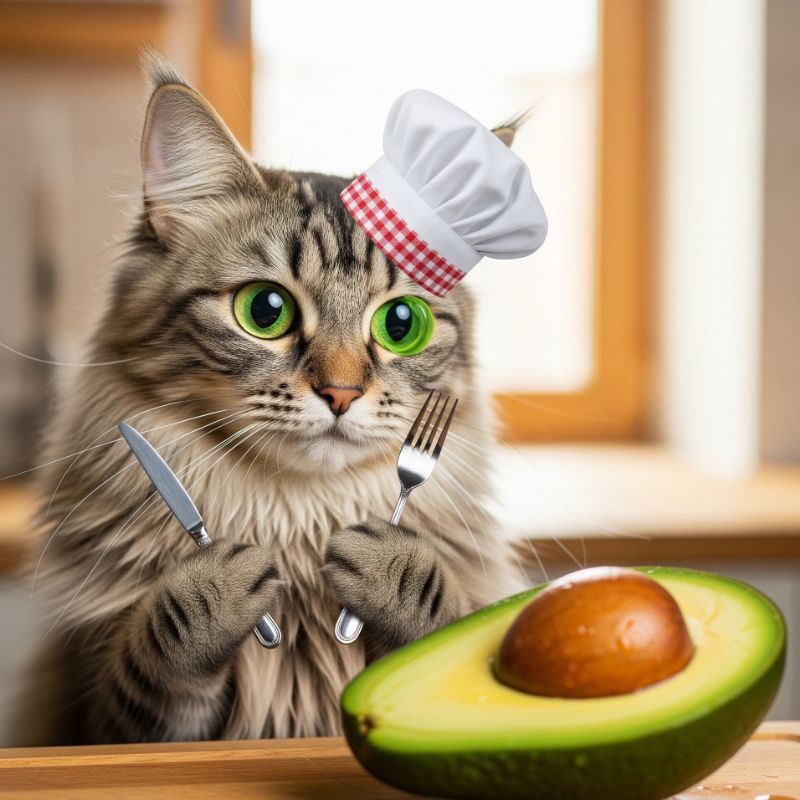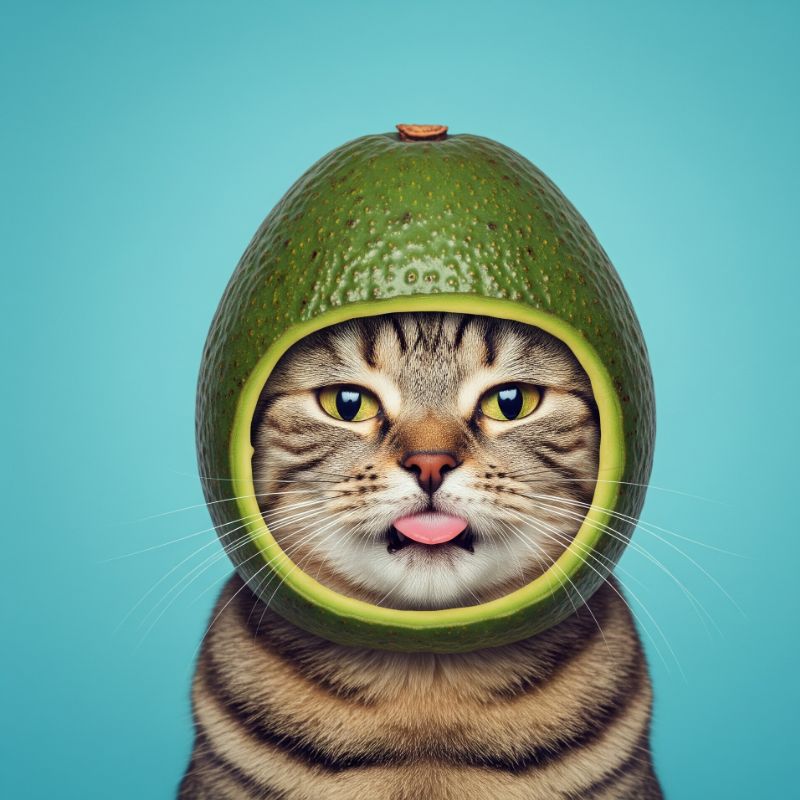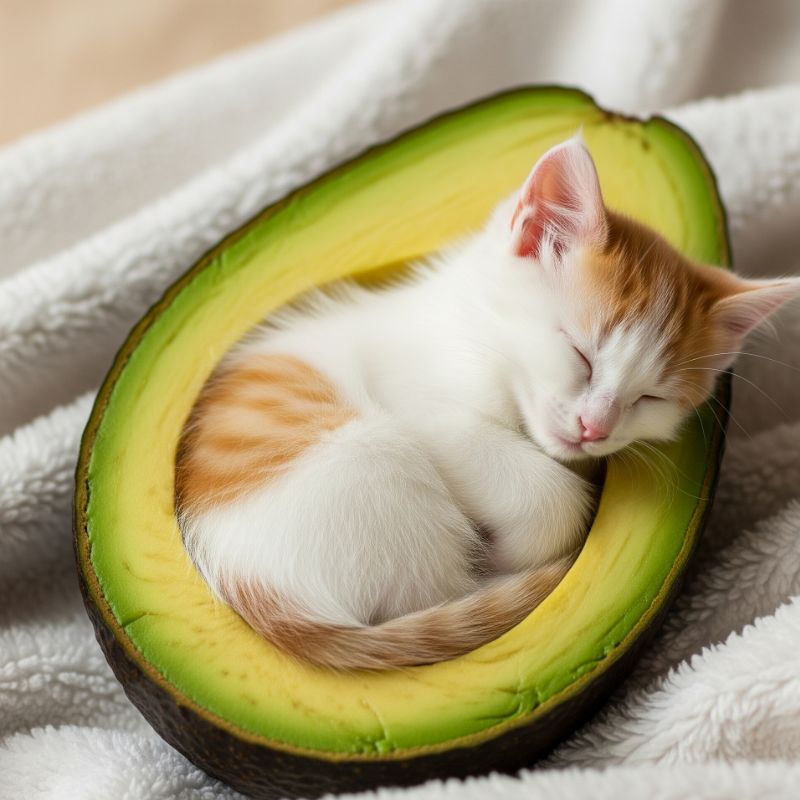Avocado has become a staple in many healthy human diets, praised for its healthy fats and creamy texture. As you’re preparing guacamole or slicing an avocado for toast, your cat might show some interest. This naturally leads to the question: can cats eat avocado? Unlike some other fruits or vegetables, the answer for this creamy green fruit is a firm and cautious “no.” This guide will explain the specific toxins and risks that make avocado a dangerous choice for your feline companion.
Can Cats Eat Avocado?
No, it is not recommended for cats to eat any part of an avocado. The primary reason is the presence of a toxin called persin, which is found throughout the plant. While cats are less susceptible to persin poisoning than some other animals like birds, it can still cause significant health problems. Additionally, the high fat content of the fruit’s flesh can lead to severe digestive issues. Therefore, the safest answer to “can cats eat avocado?” is to keep it away from your pet.
What Is Persin and Which Parts of the Avocado Are Dangerous?
Persin is a fungicidal toxin naturally present in the avocado plant. While humans can process it without issue, it can be harmful to many animals, including cats. The concentration of persin is highest in specific parts of the plant, making them the most dangerous.
- The Pit (Seed): Highly toxic and a major choking hazard/obstruction risk.
- The Skin: Contains a high concentration of persin.
- The Leaves and Stem: Also contain high levels of persin.
While the inner, green flesh contains the lowest concentration of persin, it is not entirely free of it. This is different from other fruits where only certain parts are dangerous; for instance, when asking can cats eat apples, the main danger is the seeds, but the flesh is considered safe. With avocado, the risk is more widespread.
Does Avocado Offer Any Health Benefits for a Cat?
While avocados are a “superfood” for humans, these benefits do not translate to cats. As obligate carnivores, their systems are not designed to digest plant matter effectively or derive key nutrients from it. The risks associated with avocado far outweigh any minor potential benefits.
| Nutrient (in Flesh) | Impact on Cats |
|---|---|
| High Fat Content | Primary danger; can cause pancreatitis and vomiting. |
| Calories | Very high; contributes to obesity. |
| Fiber | Minimal benefit; cats require very little fiber. |
| Vitamins/Minerals | Not in a form easily utilized by a cat’s carnivorous system. |
Why Is the High Fat Content a Problem?
Even if you were to ignore the risk of persin, the extremely high fat content of avocado flesh is a major problem for cats. A cat’s digestive system is not equipped to handle such a large, sudden fat load. Ingesting fatty foods like avocado can lead to:
- Pancreatitis: A painful, severe, and potentially fatal inflammation of the pancreas.
- Gastrointestinal Upset: Vomiting and diarrhea are common reactions.
- Obesity: Regularly feeding high-fat, high-calorie foods contributes to weight gain and related health problems.
Many human foods are unsuitable for cats due to their composition. For instance, the main reason to avoid asking can cats eat popcorn is the added fat and salt, while for plain fillers like when asking can cats eat rice, the issue is a lack of nutrients.
What Should I Do if My Cat Eats Avocado?
If you know or suspect your cat has eaten any part of an avocado, especially the skin or pit, it’s important to act calmly and quickly.
- Identify the Part and Amount: Determine what part of the avocado your cat ate and roughly how much. This information is vital for the veterinarian.
- Contact Your Vet Immediately: Call your veterinarian or an animal poison control center right away. Do not wait for symptoms to appear. The experts at the Pet Poison Helpline are an excellent resource.
- Follow Veterinary Advice: Your vet will provide instructions based on the situation. Do not induce vomiting unless specifically told to do so by a professional.
How Does the Risk of Avocado Compare to Other Foods?
When considering the question “can cats eat avocado?”, it’s helpful to place it on a spectrum of risk. It is more dangerous than a simple processed fruit product like when asking can cats eat applesauce, which is primarily a sugar risk. However, it is not as acutely and universally toxic as some other foods. The risk of avocado is twofold: the specific toxin (persin) and the general danger of its high fat content. At petomiz, we advise erring on the side of caution and avoiding it altogether.
What Are Some Healthy, High-Fat Treats I Can Give Instead?
If you’re looking to give your cat a rich, satisfying treat, there are many safer and more species-appropriate options than avocado. Healthy fats are an important part of a cat’s diet, but they should come from animal sources.
- Small Pieces of Cooked Salmon: Rich in healthy omega-3 fatty acids.
- Commercially Formulated Omega Chews: Treats designed to support skin and coat health.
- A Tiny Dab of Fish Oil: A drop of high-quality fish oil on their food can be very beneficial.
For a broader look at safe sharing, exploring a comprehensive guide that answers what can cats eat that are human food can provide a long list of safer alternatives for your pet.
Conclusion
In conclusion, the answer to the question “can cats eat avocado?” is a firm no. The presence of the toxin persin in the pit, skin, and leaves, combined with the dangerously high fat content of the flesh, makes it a risky and unhealthy choice for any cat. With so many safe, healthy, and delicious alternatives available, there is no good reason to risk your cat’s health with this popular human food.
Frequently Asked Questions About Cats and Avocado
Here are quick answers to some common questions about the risks of avocado for cats. This information should not replace the professional advice of a veterinarian.
1. Is avocado oil safe for cats?
No, avocado oil is not safe for cats. While it may contain less persin than other parts of the plant, it is an extremely concentrated source of fat, which can easily trigger pancreatitis or severe digestive upset.
2. What if my cat just licked a tiny bit of the flesh?
A single, tiny lick of the inner flesh is unlikely to cause serious poisoning in a healthy adult cat. However, you should still monitor them closely for any signs of vomiting, diarrhea, or lethargy and call your vet if you are concerned.
3. Are avocados as dangerous to cats as they are to birds?
No, cats are considered less susceptible to persin poisoning than birds, which can die very quickly after ingestion. However, “less susceptible” does not mean safe, and the risk of pancreatitis from the fat is still very high.



